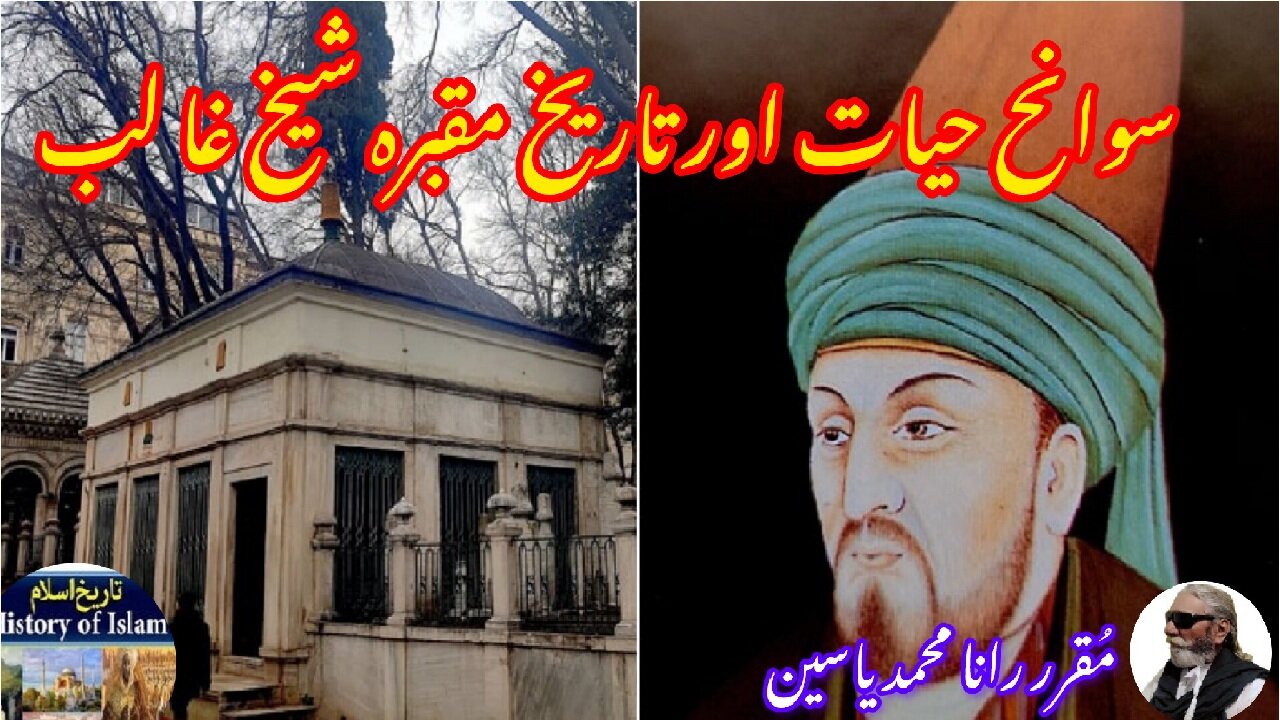Premium Only Content

Sheikh Ghalib and the history of his shrine شیخ غالب کی سوانح عمری اور ان کے مزار کی تاریخ
@islamichistory813 #galib #mehmed #esad #dede,#sufisaint #cultural #heritage #biography #islamic #mysticism #islamic #philosophy #shrine #historical #figures
Biography of Sheikh Ghalib and the history of his shrine
Dekhti Aankhooon aur sountay kaanoon ko Asslamoalaikum, sisters, brothers friends and elders, in informative series videos of Islamic ascolars, sufisaints, cultural heritages, islamic philosophys, islamic mysticisms and historical figures. today we are describing biography of Sheikh Ghalib and the history of his shrine.
Galib Mehmed Esad Dede, more commonly known as Sheikh Ghalib, was a prominent Turkish divan poet and mystic who lived from 1757 until his death on 3 January 1799. Born Muhammad, he later adopted the pen name Es’ad, which was given to him by his teacher, Hodja Ne?’et, with whom he studied and participated in literary debates until 1784. After his time with Ne?’et, he adopted the pen name Gâlib, which became widely recognized and associated with his poetry. Ghalib’s work as a poet was deeply influenced by his mystical spirituality and Sufi beliefs, reflecting a synthesis of poetic mastery and spiritual insight. His contributions to Turkish literature, particularly through the genres of divan poetry and mystical Sufism, remain significant, and his works continue to be celebrated in Turkish literary traditions.
In 1791, Ghalib Mehmed Esad Dede was appointed as the sheikh of the Gulta Mevlevi Lodge, a position he held until his death. The Mevlevi Order, also known as the Whirling Dervishes, was a Sufi order founded by the followers of the famous mystic and poet Jalal ad-Din Rumi. The order is known for its distinctive practice of whirling as a form of meditative and spiritual expression, symbolizing the soul’s journey towards God. As the sheikh of the Gulta Mevlevi Lodge, Ghalib Mehmed Esad Dede played a key role in preserving and promoting the teachings of Sufism, particularly the mystical practices associated with the Mevlevi tradition. His position as the leader of this lodge further cemented his place in the spiritual and literary culture of the time.
Ghalib’s death in 1799 marked the end of a significant chapter in the history of the Mevlevi Order. He passed away in Istanbul, and his legacy as a poet and mystic continued to influence future generations of Turkish intellectuals, poets, and Sufis. His contributions to the integration of mystical spirituality and literary creativity are particularly noteworthy, and his work bridged the realms of poetry and religious devotion, deeply impacting the literary and spiritual landscapes of the Ottoman Empire.
After his death, a mausoleum was constructed in his honor, where Ghalib was laid to rest. The mausoleum is located in the courtyard of the Gulta Mevlevi Lodge in Istanbul, the very place where he had served as the sheikh. This site not only holds his physical remains but also serves as a space for contemplation, spiritual reflection, and homage to his teachings and contributions to Sufism and Turkish literature. The mausoleum is a testament to the profound respect that Ghalib enjoyed during his life and after his passing, with his followers and admirers seeking to honor him by preserving his memory through this sacred site.
The mausoleum itself was built by his disciples and followers, who were deeply moved by his death and wished to commemorate his spiritual and intellectual legacy. As the sheikh of the Gulta Mevlevi Lodge, Ghalib had garnered a devoted following, and his passing left a spiritual void that his followers sought to fill by creating a lasting tribute. The construction of his mausoleum served as an act of reverence and devotion, ensuring that Ghalib’s teachings would continue to be honored and that his memory would live on for centuries to come. Over the years, the mausoleum has become a pilgrimage site for those who revere his spiritual insights, his literary works, and his role in shaping the mystical traditions of the Mevlevi Order.
Architecturally, the mausoleum reflects the Ottoman aesthetic of the period, featuring classical Islamic designs and ornamentation. The structure includes elements common to Sufi mausoleums, such as a domed roof and intricately decorated tiles, creating an environment that is both serene and inspiring. The mausoleum is situated in a peaceful garden, offering visitors a tranquil space for reflection and spiritual practice. The location of the mausoleum within the Gulta Mevlevi Lodge is significant, as it ties Ghalib’s memory directly to the place where he had spent much of his life serving the Mevlevi Order. The site remains a place not only of physical remembrance but also of spiritual connection, as pilgrims continue to visit to pay their respects to one of the great Sufi mystics of the Ottoman period.
In modern times, the mausoleum and the Gulta Mevlevi Lodge have become important cultural and historical landmarks. Visitors come from around the world to explore the life and works of Sheikh Ghalib, to reflect on his mystical poetry, and to learn more about the Sufi traditions that he helped preserve. The legacy of Ghalib Mehmed Esad Dede lives on through his poetry and the spiritual practices of the Mevlevi Order, which continues to inspire people interested in Sufism, mysticism, and Turkish literary traditions.
In conclusion, Sheikh Ghalib, also known as Ghalib Mehmed Esad Dede, died on 3 January 1799, leaving behind a rich legacy of poetry and mysticism. His shrine, built by his disciples and followers, is located in the courtyard of the Gulta Mevlevi Lodge in Istanbul, the place where he had served as the sheikh. The mausoleum, an architectural and spiritual testament to his life and work, continues to be a site of pilgrimage and reverence, where visitors come to honor his memory and reflect on his contributions to Turkish literature and the Sufi tradition.
With this, we seek your permission until tomorrow, tomorrow we will describe the biography of Mir Syed Muhammad Nurbakhsh Qahistani and the history of his Shrine.
Allah Hafiz
==============================
-
 7:53
7:53
ISLAMIC HISTORY
12 hours agoBiography of Al-Abbas ibn Said al-Jawhari سیرت العباس بن سعید الجوہری
8 -
 9:51:58
9:51:58
Dr Disrespect
13 hours ago🔴LIVE - DR DISRESPECT - 10 WINS ON CONTROLLER - BO7 TOMORROW
295K20 -
 1:24:56
1:24:56
Glenn Greenwald
7 hours agoTrump Declares Cities as the Enemies Within; Reagan Appointed Judge Slams Trump Over Speech Crackdowns; American ER Doctor on Gaza Atrocities | SYSTEM UPDATE #524
121K86 -
 LIVE
LIVE
I_Came_With_Fire_Podcast
13 hours agoPete Hegseth and the Chamber of Standards | Digital IDs | Taiwan Chips & Salsa | CDL Crisis
314 watching -
 2:01:46
2:01:46
Adam Does Movies
12 hours ago $0.26 earnedTalking Movies + Ask Me Anything - LIVE
14.9K -
 29:11
29:11
Nick Shirley
5 hours ago $2.62 earnedPortland has Fallen... ANTIFA Take Control of City
16.9K29 -
 1:19:00
1:19:00
VapinGamers
4 hours ago $0.74 earnedJump Space - We All Scream in Space - Early Access - !rumbot !music
16.1K1 -
 1:50:12
1:50:12
Joker Effect
3 hours ago(Kick) Streamers Have Ruined The Streaming Landscape and Here is How! Reviewing Phase Partners...
23.2K1 -
 3:46:40
3:46:40
The Blood Lust Gaming
6 hours agoClair Obscur: Expedition 33 - LVL 1 challenge run pt.3
12.4K -
 2:11:38
2:11:38
Nikko Ortiz
5 hours agoPTSD Is Fun Sometimes | Rumble LIVE
22.2K2